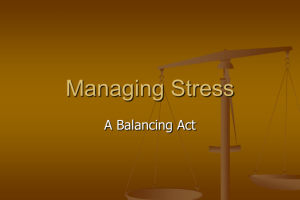Balancing Act: Managing Stress for Simply Healthy Living

Introduction to Managing Stress for Simply Healthy Living
Understanding the Impact of Stress on Health
Stress is a part of life; it’s inescapable. When faced with tight deadlines or personal life challenges, many individuals often feel the weight of stress. It’s important to recognize how this pressure can seep into our bodies and minds, impacting overall health. Research shows that chronic stress can lead to various health problems, including:
- Balancing Act: Managing Stress for Simply Healthy Living
- Introduction to Managing Stress for Simply Healthy Living
- Understanding the Impact of Stress on Health
- Importance of Balancing Stress for Overall Well-being
- Identifying Sources of Stress in Daily Life
- Work-related Stressors
- Personal Life Challenges
- Effective Stress Management Techniques
- Mindfulness and Meditation
- Exercise and Physical Activity
- Prioritizing Self-care in Stressful Situations
- Healthy Eating Habits
- Quality Sleep and Rest
- Cultivating a Supportive Environment for Stress Management
- Building Strong Social Connections
- Seeking Professional Help and Guidance
- Increased risk of heart disease
- Digestive disorders
- Weakened immune system
- Anxiety and depression
For instance, a friend once shared how high-stress levels at work led her to develop insomnia, impacting her mood and productivity. She realized that acknowledging and addressing her stress was the first step towards regaining control of her health. Understanding the physiological effects of stress is crucial. The body releases stress hormones like cortisol, which, when elevated for extended periods, can disrupt many bodily functions. Thus, appreciating and understanding the ramifications of stress isn’t just an academic pursuit, but a vital component of simply healthy living.
Importance of Balancing Stress for Overall Well-being
Balancing stress is paramount for maintaining well-being. Not all stress is negative; in fact, some stress can be motivational, pushing us to meet deadlines or tackle challenges. This positive stress, or eustress, is essential for growth and achievement. However, the key lies in finding equilibrium. To balance stress effectively, consider these strategies:
- Identify stressors: Keep a journal to track what triggers your stress. This awareness can help you manage responses.
- Set realistic goals: Break large tasks into smaller, manageable steps to prevent feeling overwhelmed.
- Incorporate relaxation techniques: Schedule time for activities that promote relaxation, such as yoga or deep-breathing exercises.
Cultivating a well-balanced approach to stress not only mitigates its adverse effects but also fortifies overall health. As you navigate through daily challenges, remember that balance fosters resilience, empowering you to embrace life’s demands with a clearer mind and stronger spirit.
Identifying Sources of Stress in Daily Life
Work-related Stressors
After establishing the importance of balancing stress, it’s essential to take a closer look at where stress commonly stems from in everyday life. One of the primary culprits is work-related stress. In a fast-paced work environment, multiple factors can contribute to increased pressure, such as:
- High workload: Employees often juggle multiple projects, leading to feelings of being overwhelmed.
- Tight deadlines: The pressure to meet looming deadlines can create a sense of urgency that escalates stress levels.
- Conflict with coworkers: Interpersonal challenges can create a toxic work atmosphere, further compounding stress.
- Lack of control: Feeling powerless in decision-making or facing constant changes without input can increase anxiety.
A colleague once expressed how juggling countless meetings alongside project deadlines amplified her anxiety, ultimately leading her to burnout. Recognizing these workplace stressors is the first step toward developing effective coping strategies.
Personal Life Challenges
Beyond the workplace, personal life challenges also play a significant role in contributing to stress. These issues might include:
- Family responsibilities: From caring for children to looking after aging parents, balancing these demands can be taxing.
- Financial pressures: Concerns over budgeting, debts, or unexpected expenses can weigh heavily on one’s mind.
- Health concerns: Experiencing health challenges, either personally or for loved ones, can evoke feelings of worry and helplessness.
- Life transitions: Events such as moving, marriage, or divorce can be both exciting and stress-inducing.
For example, someone navigating a major life change, like welcoming a new child into the family, might feel a mix of joy and overwhelming stress. It’s crucial to acknowledge that personal challenges can significantly impact mental and emotional health. By recognizing these sources of stress, individuals can take proactive steps to mitigate their effects. Whether it’s adjusting work habits, improving communication, or establishing support systems, understanding the roots of stress is foundational to managing it effectively.
Effective Stress Management Techniques
Mindfulness and Meditation
Having identified the sources of stress in daily life, it becomes crucial to explore effective techniques that can help manage this pressure. One powerful approach is mindfulness and meditation. These practices encourage individuals to focus on the present moment, promoting a sense of calm and clarity. Mindfulness involves being fully engaged in the current experience, acknowledging thoughts and feelings without judgment. On the other hand, meditation provides a dedicated space for relaxation and reflection. Here are some practical ways to integrate mindfulness into daily life:
- Start small: Even a few minutes of meditation each day can make a difference.
- Practice deep breathing: Take slow, deep breaths, inhaling through the nose and exhaling through the mouth. This simple strategy can help reduce stress immediately.
- Dabble in guided sessions: There are plenty of apps available with guided mindfulness sessions suitable for beginners.
A friend of mine took up mindfulness when he felt overwhelmed by work commitments. He started with just five minutes of meditation each morning to set a positive tone for his day. Over time, he found his focus sharpens, and stress became more manageable.
Exercise and Physical Activity
Another vital technique for managing stress is regular exercise and physical activity. Physical health and mental well-being are intricately connected; thus, engaging in regular exercise can significantly enhance mood and reduce stress levels. Here’s how exercise helps:
- Releases endorphins: Exercise releases these “feel-good” hormones, improving your mood naturally.
- Improves sleep quality: Regular activity can lead to better sleep, reducing fatigue and irritability.
- Boosts self-confidence: Achieving fitness goals, no matter how small, can elevate your self-esteem.
Whether it’s going for a brisk walk, attending a dance class, or practicing yoga, it’s essential to choose activities you enjoy. For instance, after struggling with anxiety, another acquaintance found solace in hiking. The rhythmic nature of the trail and connection to nature provided her a formidable reprieve from daily stressors. Incorporating mindfulness and exercise into daily routines can create a robust framework for managing stress effectively. By embracing these techniques, individuals take proactive steps toward achieving a healthier, more balanced life.
Prioritizing Self-care in Stressful Situations
Healthy Eating Habits
As we continue to explore effective stress management techniques, prioritizing self-care becomes paramount, especially during stressful situations. One essential aspect of self-care is maintaining healthy eating habits. Nutrition directly influences mood and energy levels, making it crucial to fuel the body with the right foods during times of stress. A well-balanced diet can help stabilize your mood and improve resilience against stress. Here are some tips to develop healthy eating habits:
- Prioritize whole foods: Focus on fruits, vegetables, whole grains, and lean proteins that provide essential nutrients.
- Stay hydrated: Dehydration can worsen feelings of stress and fatigue. Aim for at least 8 cups of water daily.
- Limit caffeine and sugar: While these might provide temporary energy boosts, they can lead to crashes that exacerbate stress.
- Practice mindful eating: Take time to savor each bite, which can help manage overeating and improve digestion.
For instance, when a demanding work project was looming over her, a friend turned to comfort food, which left her feeling sluggish. After making a conscious effort to prepare refreshing salads and smoothies, she noticed a significant increase in her energy and focus.
Quality Sleep and Rest
Another crucial pillar of self-care is ensuring quality sleep and rest. Stress can often lead to sleepless nights, creating a vicious cycle of fatigue and heightened anxiety. Therefore, developing healthy sleep habits is vital for overall well-being. To improve sleep quality, consider these strategies:
- Establish a routine: Go to bed and wake up at the same time each day to regulate your body’s internal clock.
- Create a relaxing bedtime environment: Keep your bedroom cool, dark, and quiet to promote better sleep.
- Limit screen time before bed: Reduce exposure to screens at least an hour before bedtime to minimize disruption to melatonin production.
- Practice relaxation techniques: Engage in calming activities such as reading or gentle stretching before sleep.
A personal anecdote comes from an acquaintance who struggled with insomnia due to chronic stress. By adopting a consistent sleep routine and incorporating evening relaxation techniques, she transformed her sleep quality, helping her manage stress more effectively during the day. By prioritizing healthy eating habits and quality sleep, individuals can build a strong foundation for effective self-care. This proactive approach not only alleviates stress but also enhances overall health, making life’s challenges feel more manageable.
Cultivating a Supportive Environment for Stress Management
Building Strong Social Connections
As we conclude the exploration of self-care practices, it’s essential to consider the role of social support in effective stress management. Building strong social connections is a powerful tool that can help individuals cope with stress more effectively. After all, a supportive network can provide both comfort and practical assistance during challenging times. Here are some strategies for fostering strong relationships:
- Stay connected: Make it a priority to check in with friends and family regularly. Simple messages or calls can strengthen bonds.
- Participate in group activities: Engage in community events, sports teams, or hobby groups to meet new people and enrich existing relationships.
- Share your feelings: Open up about your challenges with trusted friends. Sharing can lighten your emotional load and provide new perspectives.
A personal story comes from one of my colleagues, who felt isolated during a stressful project. Seeking to address her feelings, she reached out to a close friend and shared her struggles. The supportive conversation not only provided her with comfort but also renewed her sense of connection and boosted her resilience.
Seeking Professional Help and Guidance
While strong connections are crucial, sometimes individuals may need additional support. Seeking professional help and guidance can be a vital step in managing stress effectively. Therapists, counselors, or life coaches can offer personalized strategies and insights tailored to individual needs. Factors to consider when seeking professional help include:
- Finding the right fit: Look for professionals who specialize in stress management or cognitive-behavioral therapies.
- Utilizing employee assistance programs: Many workplaces offer resources for mental health support that can be beneficial.
- Exploring group therapy: Group sessions can provide a sense of community while addressing shared challenges.
For example, a former classmate faced overwhelming stress during a major life transition. He sought the advice of a therapist, who provided him with coping mechanisms and a safe space to voice his fears. This professional guidance proved transformative, equipping him with tools to manage his stress more effectively. In summary, cultivating a supportive environment through strong social connections and professional guidance is essential for effective stress management. By actively engaging with others and seeking help when needed, individuals can create a buffer against stress, leading to a more balanced and fulfilling life.





